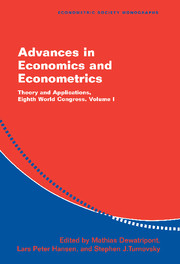Book contents
- Frontmatter
- Contents
- List of Contributors
- Preface
- 1 Auctions and Efficiency
- 2 Why Every Economist Should Learn Some Auction Theory
- 3 Global Games: Theory and Applications
- 4 Testing Contract Theory: A Survey of Some Recent Work
- 5 The Economics of Multidimensional Screening
- A Discussion of the Papers by Pierre-Andre Chiappori and Bernard Salanié and by Jean Charles Rochet and Lars A. Stole
- 6 Theories of Fairness and Reciprocity: Evidence and Economic Applications
- 7 Hyberbolic Discounting and Consumption
- A Discussion of the Papers by Ernest Fehr and Klaus M. Schmidt and by Christopher Harris and David Laibson
- 8 Agglomeration and Market Interaction
- 9 Nonmarket Interactions
- Index
A Discussion of the Papers by Pierre-Andre Chiappori and Bernard Salanié and by Jean Charles Rochet and Lars A. Stole
Published online by Cambridge University Press: 19 January 2010
- Frontmatter
- Contents
- List of Contributors
- Preface
- 1 Auctions and Efficiency
- 2 Why Every Economist Should Learn Some Auction Theory
- 3 Global Games: Theory and Applications
- 4 Testing Contract Theory: A Survey of Some Recent Work
- 5 The Economics of Multidimensional Screening
- A Discussion of the Papers by Pierre-Andre Chiappori and Bernard Salanié and by Jean Charles Rochet and Lars A. Stole
- 6 Theories of Fairness and Reciprocity: Evidence and Economic Applications
- 7 Hyberbolic Discounting and Consumption
- A Discussion of the Papers by Ernest Fehr and Klaus M. Schmidt and by Christopher Harris and David Laibson
- 8 Agglomeration and Market Interaction
- 9 Nonmarket Interactions
- Index
Summary
Each of these surveys is a “must read”: anyone who wants to analyze multi-dimensional screening models should start by reading Rochet and Stole (RS), and anyone who wants to do empirical work on contracts should begin with Chiappori and Salanié (CS). I will start this discussion (Section 1) by what I perceived to be the main message of each survey. Although the two papers are quite different in nature and in focus, they both remind us why we should be interested in contracts and organizations: when markets are incomplete or imperfect, contracts and organizations are the relevant allocation devices and are not neutral from an “efficiency” point of view. Therefore, if we want to understand the effects of economic policies, macroeconomic shocks, technological shocks on the performance of firms, or the economy, we are bound first to answer two questions.
What are the effects of contractual and organizational choices on behavior and economic performance?
What are the determinants of contractual choices?
RS and CS show how answers to these questions can be enhanced by theoretical and empirical work in contract theory. Reading these surveys and the literature, it seems fair to acknowledge two tendencies: first, that empirical work has been an active consumer of theory, but that theory has been a more timid consumer of empirical work and, second, that we seem to have many answers to (1), but fewer answers to (2).
- Type
- Chapter
- Information
- Advances in Economics and EconometricsTheory and Applications, Eighth World Congress, pp. 198 - 207Publisher: Cambridge University PressPrint publication year: 2003



